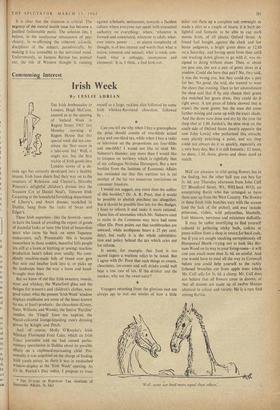Consuming Interest
Irish Week
By LESLIE ADRIAN
These Irish exporters—like the Scottish—seem to have the knack of avoiding the export of goods of doubtful looks or taste (the kind of benevolent spirit who turns his back on some Japanese endeavours, sag). Presumably this is because somewhere in those sodden, beautiful hills people are still at a loom, or knitting, or sewing; machine Production hasn't taken over totally. No com- pletely machine-made bolt of tweed ever gets that mist and heather look into it, or picks up the landscape hues the way a loom and hand- wrought item does.
But we knew of old that Irish sweaters, tweeds, stout and whiskey, the Waterford glass and the designs for women's and children's clothes, were good value; what the present 'Irish Weck' window displays emphasise are some of the lesser-known (to me, at least) products: the chocolates (Urney, Gato, Williams and Woods), the festive 'Partilite' candles, the 'Fingal' linen tea napkins, the biscuit-coloured lounge-lizarding men's dressing gowns by Knight and Petch.
And, of course, Molly O'Rourke's Irish Whiskey Flavoured Fruit Cake, which an Irish Tittles journalist told me had caused parlia- mentary speculation in Dublin about its possible effects on a cupboard-marauding child. Pre- sumably it was acquitted on the charge of leading Irish youth astray, 'as there it was in unabashed window-display at the 'Irish Week' opening. As it's St. Patrick's Day today, I propose to treat * Tun FUTURE OF PURCHASE TAX. (Institute of Economic Affairs, 3s. 6d.) myself to a large, reckless slice followed by some Irish whiskey-flavoured chocolate, followed by . . .
Can you tell me why when I buy a gramophone the price should consist of two-thirds actual price and one-third tax, while when 1 buy a radio or television set the proportions are four-fifths and one-fifth? I would not like to steal Mr. Nabarro's thunder, any more than I would like to trespass on territory which is rightfully that of my colleague Nicholas Davenport. But a new booklet from the Institute of Economic Affairs has reminded me that this wartime tax is yet another of the far too numerous restrictions on consumer freedom.
would not suggest, any more than the author of this booklet,* Dr. A. R. Prest, that it would be possible to abolish purchase tax altogether. But it should be possible (too late for this Budget, I fear) to reform it and make it more rational. Those lists of anomalies which Mr. Nabarro used to recite in the Commons may have had some effect (Dr. Prest points out that toothbrushes are untaxed, while toothpaste bears a 25 per cent. duty), but really it is the whole administra- tion and policy behind the tax which cries out for reform.
It seems, for example, that food is too sacred (again a wartime relic) to be taxed. But I agree with Dr. Prest that such things as sweets, chocolates, ice-cream and soft drinks could well bear a low rate of tax. If the drinker and the smoker, why not the sweet-eater?
* Voyagers returning from the glorious east are always apt to trot out stories of how a little tailor ran them up a complete suit overnight or made a shirt in a couple of hours; it is both de- lightful and fantastic to be able to cap such stories from, of all places, Oxford Street. A friend had bought, .against the clock and her better judgment, a bright green dress at 12.10 on a Saturday; and having spent from then until one tracking down gloves to go with it, was re- signed to doing without shoes. Then, at about ten past one, she saw a pair of green shoes in a window. Could she have that pair? No, they said, it was the wrong size, but they could dye a pair for her. No good, she said, she wanted to wear the shoes that evening. Then to her astonishment the shop said that if by any chance their green dye matched her green dress, they could do it right away. A test piece of fabric showed that It wasn't the same green; but the man did some further mixing and came up with the exact shade. And the shoes were done and dry by the time the shop shut at 1.30. Jordan's, the shoe shop on the south side of Oxford Street (nearly opposite the new John Lewis) who performed this miracle, were plainly stretching a point, and say they could not always do it so quickly, especially on a very busy day. But it is still fantastic : 12 noon, no dress, 1.30, dress, gloves and shoes dyed to match.
* Half our pleasure in wild spring flowers lies in the finding, but the other half you can buy for 3s 6d. any Thursday afternoon from John Cuff (23 Blandford Street, WI; WELbeck 4932), an enterprising florist who has arranged to have them sent up from the West Country. The flowers in these fresh little bunches vary with the season (and the luck of the picker), and may include primroses, violets, wild polyanthus, bluebells, fruit blossom, narcissus and miniature daffodils.
It may be rather mortifying to find yourself reduced to gathering sticky buds, catkins or pussy-willow from a shop in return,forhard cash, but if you are caught sneaking surreptitiously off Hampstead Heath—trying not to look like Bir- nam Wood on its way to your living-room—it will cost you much more than 2s. 6d. an armful. And you would have to steal all the way to Cornwall before you could help yourself to the richly lichened branches cut from apple trees which Mr. Culf sells for 3s. 6d. a clump. Mr. Culf does not believe that all flowers come in dozens, or that all dozens are made up of twelve blooms identical in colour and variety. He is a rare find among florists.
'Well, some tire bred more equal than others:






































 Previous page
Previous page